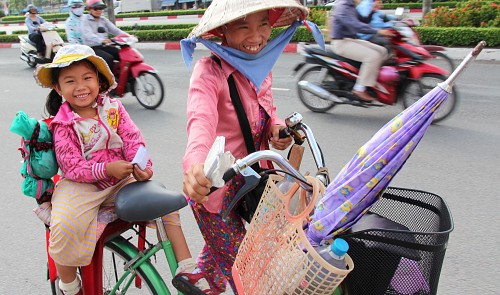The first word I learnt in Vietnam was ‘khong.’ You say it nearly the same as the huge gorilla’s last name, ‘King Kong.’ As any well-experienced traveler knows, knowing how to say ‘no’ is often much more important than ‘yes’! Later you get to learn more, like ‘ok’ instead of yes. ‘Khong mua,’ (moo-a) I don’t want to buy, came in particularly useful as I strolled around Hanoi in the early weeks of my first visit.
It seems to me that local people only say yes when they don’t know what to say. “Wow! You look great today!” “Yes…”
As I settled in Hoi An five years ago, I started to realize that ‘no’ or asking about possibilities takes on very surreal aspects. Somehow, the idea of suggesting something different to what a menu offered became a comedy routine.
“Can I have the baguette with butter and jam instead of a baguette with marmalade?”
Both items were on the menu.
“NO!” Huh? But I thought… “No!”, the poor flustered waitress starts shaking her hands in the air, a gesture often labeled ‘jazz hand’s’ by long suffering expats. I settled for the original order…Can’t be a difficult customer, what would people think?
What she meant is it’s not possible to change the menu orders. It is just not possible. Never mind that it would only take a few seconds to get some jam. This was no big thing and at the time, I thought it was quite funny. Yet the implications of that one little scene were to reverberate repeatedly in my dealing with the locals.
Still later, I came to understand that ‘yes’ may NOT mean ‘yes’, ‘no problem’ could be ‘big problem’ and ‘maybe’ means ‘I have no idea’. A personal favorite of mine is ‘You don’t worry about that’, meaning run as fast as you can for the front door because someone’s going to do something stupid…
It is all a question of how we usually do things. For example, my editor at this newspaper once pointed out to me, “Vietnamese don't say ‘I don't think I can do that’. We simply say ‘I cannot do that.’" Say something often enough in a particular way and people start to live and believe in that way. It starts to create a kind of inflexibility that becomes a way of life.
So why does it come about? One idea to understand is local people will go out of their way to avoid unpleasantness in dealing with people so they will say anything except “I won’t do that.” So rather than say that they hate you and would never serve you in a million years, they just say “no,” accompanied by jazz hands!
The second idea is decision making. There are few people with absolute, total power to make choices and say “it will be so.” I remember once asking the landlord when he’d get the water pump fixed. He stood there for nearly three minutes staring into the sky then said “Maybe tomorrow.” They came to fix the pump an hour later. So he had no idea when it could be done, said something to keep me happy, jumped on the phone, talked to the plumper, the plumping shop, his wife, his friend and probably his best friend before coming to a decision. I bet his wife settled the issue. Never argue with the boss!
One of the hardest lessons I have to teach hotel front office staff is the idea of suggesting alternatives when guests have requests or problems. “But teacher, we never do that.” It’s a fait accompli (it’s French), meaning it’s been previously decided. What’s interesting about this is that if people do try to find another way, it’s often easier than the original idea yet is rarely adopted as a new way of doing things because “that’s the way we’ve always done it.”
It’s a lesson in tourism that the Thai people learnt well and now make millions of dollars from.
For westerners, we might usually say, “I don’t think I can do that.” Meaning it’s not possible now, or it’s not possible for me but might be possible for someone else to do or finally, I could be persuaded to do that. I used to do this as a way of being polite and helpful to make a good impression with local businesses.
Still, as many expat knows, decisions agreed on before are changed at a moment’s notice. When schools and businesses tell me “Oh, we changed the timetable… “I just quietly say, “I can’t do that,” which works remarkably well. And we stick to the original plan. On the other hand, I cancel the deal much to the surprise of the locals!
So the next time the waitress says “no,” just re-phase your question and you might get that marmalade!

























































